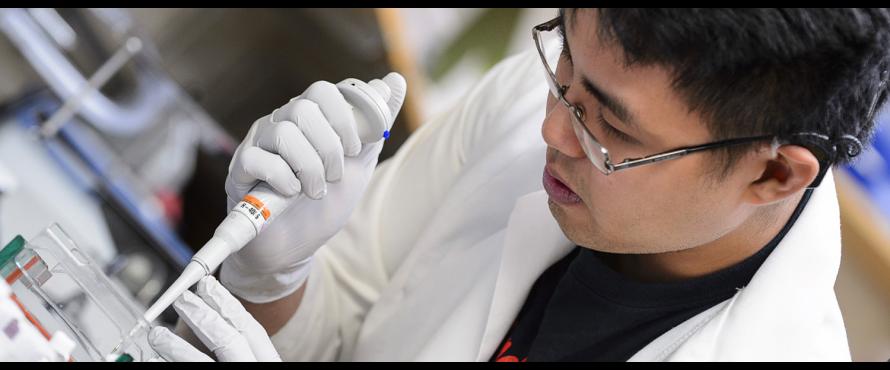News & Features
Phu Duong’s career in biology is well underway.
After successfully defending his master’s thesis at Northeastern Illinois University over the summer, he has begun a Ph.D. program in Cell and Molecular Pathology at the University of Wisconsin-Madison. There, he hopes to become involved in the field of epigenetics, which is the study of changes in gene activity that are not caused by changes in the DNA sequence. Translation: The guy is smart.
Duong’s research is about understanding the structure of photoreceptor proteins and how the structure provides the protein itself the ability to absorb and transmit light. Or, as Duong explained in the closest thing he could find to layman’s terms: “The photoreceptor is suddenly able to absorb light when you put a bunch of amino acids together, sort of like how human consciousness is formed when you put a bunch of neurons together.”
Perhaps not surprisingly, Northeastern Associate Professor of Biology Emina Stojković remembers Duong as a hard-working, independent student.
“My favorite memory of Phu is of him giving his talk at his master's thesis defense,” Stojković said. “He was so calm and incredibly well prepared. Everyone was impressed by him. This was the first oral defense by a deaf student in my department, and he did a magnificent job.”
Indeed, Duong is deaf, and yet that’s only a footnote in any conversation about his accomplishments in Northeastern’s master’s program in Biology.
“In lab life, it is not really that bad,” Duong said. “There, I tend to have one-on-one conversations with people. I actually can communicate verbally but it takes people a bit of time to get used to how I talk and listen.”
According to Northeastern’s Office of Student Disability Services (SDS), the University’s deaf student population ranges from five to 12 in any given semester, and about half of them are graduate students. SDS provides academic and technical assistance to students, including deaf and hard of hearing services.
“In group conversations and deep discussions, I always want to have sign language interpreters helping me out,” Duong said. “The tough part is that sometimes the meetings can be spontaneous and I have to coordinate interpreter service in advance.”
Duong was born in Vietnam, where his father served in the army and his mother attended law school. When Duong was a baby, his family moved to Chicago to start a new life.
“My childhood was actually great despite my complete hearing loss,” Duong said of his early years in the U.S. “But high school was challenging for me to adjust. That experience proved to be advantageous later on as it taught me to figure out how to respond in socially ambiguous situations.”
While in high school, a teacher encouraged Duong to apply for a summer internship at the American Cancer Society and he soon found himself working in a lab at Northwestern University. It was there that his interest in biology was piqued.
Duong earned a Bachelor of Science in Biology degree from University of Illinois at Chicago, then enrolled at Northeastern to pursue a master’s degree.
“I chose Northeastern because I heard that class sizes are usually small and students receive a lot of attention from professors,” Duong said. “It was also because of the educational value that Northeastern provides relative to its tuition cost.”
Duong said his long-term goal is to work in a research-intensive university. “There are universities that prioritize teaching, but it would be cool if I could see my research make an impact on healthcare somehow,” he said.
Stojković has little doubt he will make that impact.
“In his pursuit of an academic career and entering a Ph.D. program, Phu is taking on a serious challenge,” she said. “In my lifetime, I have not met a single deaf scientist who holds a Ph.D. in my area of expertise. In general, there are very few scientists with disabilities. We have to change that. If anyone can do that, Phu can.”
Photo by Jeff Miller/University of Wisconsin-Madison








